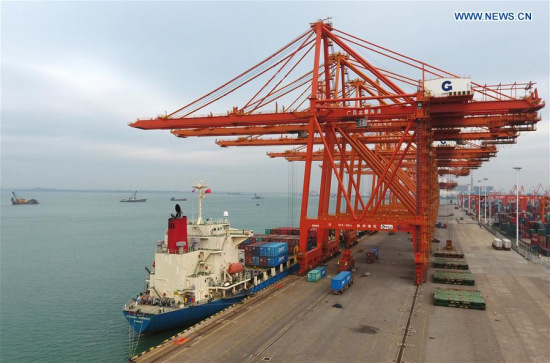
The Qinzhou Port is seen in Qinzhou City, south China's Guangxi Zhuang Autonomous Region, Jan. 10, 2018. (Xinhua/Lu Boan)
Already a major driving force for the world economy, China is poised to make greater contributions with its reaffirmed commitment to economic rebalancing.[Special coverage]
In a report on government work earlier this week, Chinese Premier Li Keqiang pledged to strengthen the fundamental role of consumption in driving economic growth, open China's market wider and defend free and fair trade. Experts believe these efforts will inject new impetus into China's growth and further boost the global economy.
"With a population of 1.3 billion, China's economic modernization will have a huge spillover effect on more robust, sustainable, balanced and inclusive global economic growth," said Zhang Zhanbin, a researcher with the Chinese Academy of Governance.
China's economy, once heavily reliant on fixed-asset investment and exports, is increasingly fueled by services and consumption. Official data showed that consumption contributed 58.8 percent of GDP, and the service sector accounted for 51.6 percent.
China now has the largest middle-income group in the world, with a population of about 400 million, and it is growing fast.
Wang Yiming, deputy director of the Development Research Center of the State Council, expected the group to have stronger and more sophisticated consumer demands.
"This year, China's retail sales are projected to surpass those in the United States in another sign of China's transformation from a 'world factory' into a 'world marketplace,'" Wang said.
While maintaining strong exports, China is also buying more from the world, with its imports up 18.7 percent year-on-year to 12.5 trillion yuan (about 2 trillion U.S. dollars) in 2017.
"Not only did China's imports continue to grow, they also cover a broader range of sectors, benefiting both developed and developing economies," said Li Daokui, an economist with Tsinghua University.
For instance, China's increased imports of crude oil and iron ore helped boost the economy of resource-rich countries, while its imports of integrated circuits and metal-working machines have benefited developed economies.
China has promised to further boost its imports. The Ministry of Commerce forecast last November that China would import more than 10 trillion U.S. dollars of goods and services in the next five years.
This year, China will host the first China International Import Expo (CIIE), showing its determination to open wider to the world and increase consumption of its fast-growing middle-income group.
More than 1,000 enterprises from over 120 countries and regions have signed up to attend the event slated for Nov. 5 to 10 in Shanghai.
Despite the rising protectionism in major economies, China has remained a staunch champion for free trade. In his report, Premier Li reiterated China's support for promoting economic globalization and protecting free trade.
"China calls for trade disputes to be settled through discussion as equals, opposes trade protectionism, and will resolutely safeguard its lawful rights," he said, noting that the country is ready to work with all parties to advance multilateral trade negotiations.
"This demonstrates China's resolve to support the right course of economic globalization, and to help address issues such as lack of inclusiveness during the process," said Liu Shangxi, head of the Chinese Academy of Fiscal Sciences.
World Bank data show that China contributed 34 percent to world economic growth from 2012 to 2016, more than the United States, European Union and Japan combined.
"China will continue to be the strongest driving force and stabilizer for the world economy," said Li Daokui, the economist.


















































